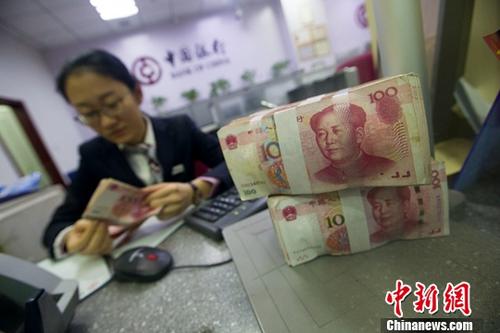(Economic Observer) In the first July of this year, “increasing” 512.3 billion yuan, why did foreign investors favor Chinese bonds?
China News Agency, Beijing, August 17 (Reporter Xia Bin) Chinese bonds have become the "sweet and sweet" in the eyes of global investors.
According to the data disclosed by Bond Connect, as of the end of July, foreign institutions held 3.77 trillion yuan (RMB, the same below) of China’s interbank market bonds, setting a new historical record. In the first seven months, domestic bonds held by overseas institutions increased by 512.3 billion yuan.
Data map: Bank staff are counting currency.
Photo by China News Agency reporter Zhang Yun
The enthusiasm of foreign investors for Chinese bonds is not only reflected in the continued “increasing”.
On the one hand, overseas institutions are actively entering the market. Data shows that in July, 5 new overseas institutions entered the interbank bond market. As of the end of July, a total of 972 overseas institutions entered the market.
On the other hand, foreign institutions are actively trading. Data shows that in July, the spot bond trading volume of foreign institutions in the inter-bank bond market was about 1.14 trillion yuan, and the average daily trading volume was about 52 billion yuan, which was basically the same as in June.
Why do foreign investors favor Chinese bonds?
In an interview with a reporter from China News Agency, Wang Youxin, a senior researcher at the Bank of China Research Institute, attributed the reasons to three points.
First, in the context of repeated overseas epidemics and greater uncertainty in economic recovery, China's economy has recovered steadily and maintained a relatively high growth rate, and the security of bonds and the rate of return are guaranteed.
Although China faced the dual impact of flood and epidemic in July, according to the latest economic data, China's economic growth level was in line with expectations, employment prices were generally stable, the international balance of payments was basically balanced, major macro indicators were in a reasonable range, and the national economy continued Stable recovery situation.
Second, compared with the overseas low interest rate and negative interest rate environment, China’s monetary policy is relatively stable, with interest rates remaining in a positive range, and with the gradual recovery of the economy, monetary policy will return to normalization, and domestic and foreign interest rates will remain at a safe boundary, attracting Cross-border capital allocation increased in RMB bonds.
The third is the stable performance of the RMB exchange rate.
“In addition to interest rate differentials, exchange rate differentials are also an important measurement factor for cross-border capital flows.” Wang Youxin pointed out that since the second half of last year, the RMB has been in a strong cycle as a whole. Foreign investors can also obtain interest rate gains in addition to interest rate gains by increasing their holdings of RMB assets. The gains from the appreciation of the renminbi have increased inflows to the bond market driven by dual factors.
"Foreign investors will continue to invest in our bonds." Wang Chunying, deputy director and spokesperson of the State Administration of Foreign Exchange, told reporters that in October this year, Chinese government bonds will be officially included in the FTSE Russell World Bond Bond Index. The relevant indexes of the mainstream will cover RMB bonds.
In addition, at the end of June, foreign capital accounted for 3.1% of the domestic bond custody volume, and there is a lot of room for improvement in the future.
But she also reminded that there will be no rapid growth in the future, because the global economy recovers, external liquidity and interest rates will return to normal.
Therefore, the pace of foreign investment in increasing domestic bond holdings should be more stable, focusing on long-term investment and diversified asset allocation.
The latest annual survey report released in the "Official Forum of International Monetary and Financial Institutions" shows that about 30% of central banks in the world plan to increase their holdings of RMB as reserve assets in the next 12 to 24 months, compared with 10% last year.
How to further improve the convenience of foreign capital's access to China's financial market, and to prevent possible capital flow risks?
Wang Youxin said that at present, foreign investment can enter the Chinese securities market through a variety of interconnection mechanisms. In the future, in addition to continuing to explore new interconnection mechanisms, more efforts should be made to improve supporting measures.
The scope of investment should be gradually relaxed, investment varieties should be increased, unnecessary quota restrictions should be removed, and the process of foreign investment entry should be simplified.
He also pointed out that it is necessary to enrich investment product systems such as financial futures, commodity futures, interest rates, exchange rates, and derivatives, develop the treasury bond market, so that all types of RMB assets can be continuously priced, and improve the cross-border capital flow supervision system, and enrich risk management tools. , Strengthen the monitoring of the flow of funds, achieve cross-market, cross-border and penetrating supervision, and realize the integrated advancement of financial opening and risk prevention and control.
(Finish)

